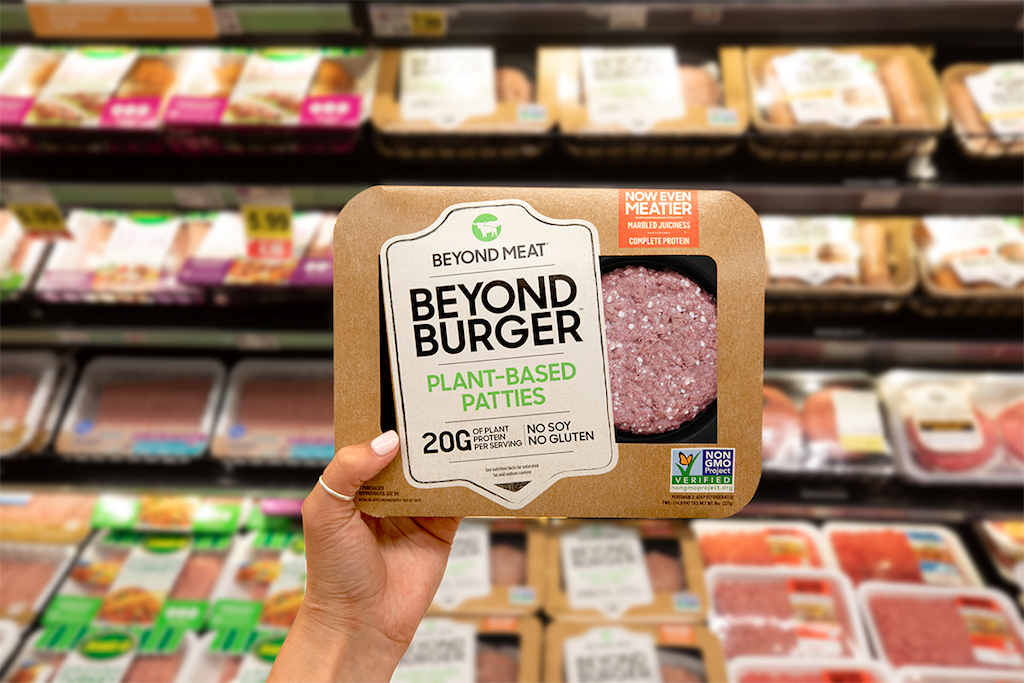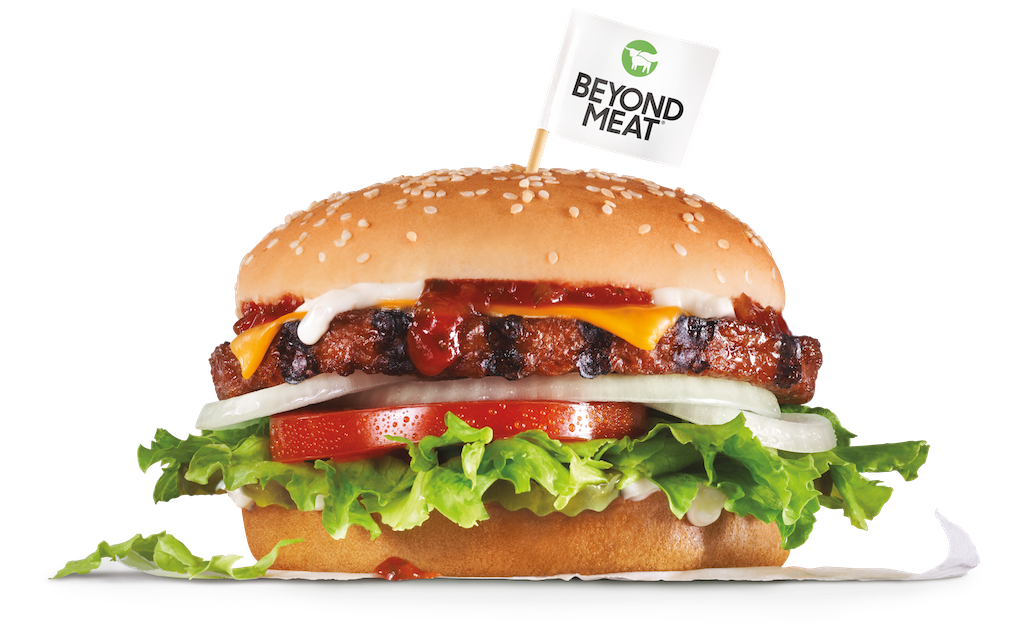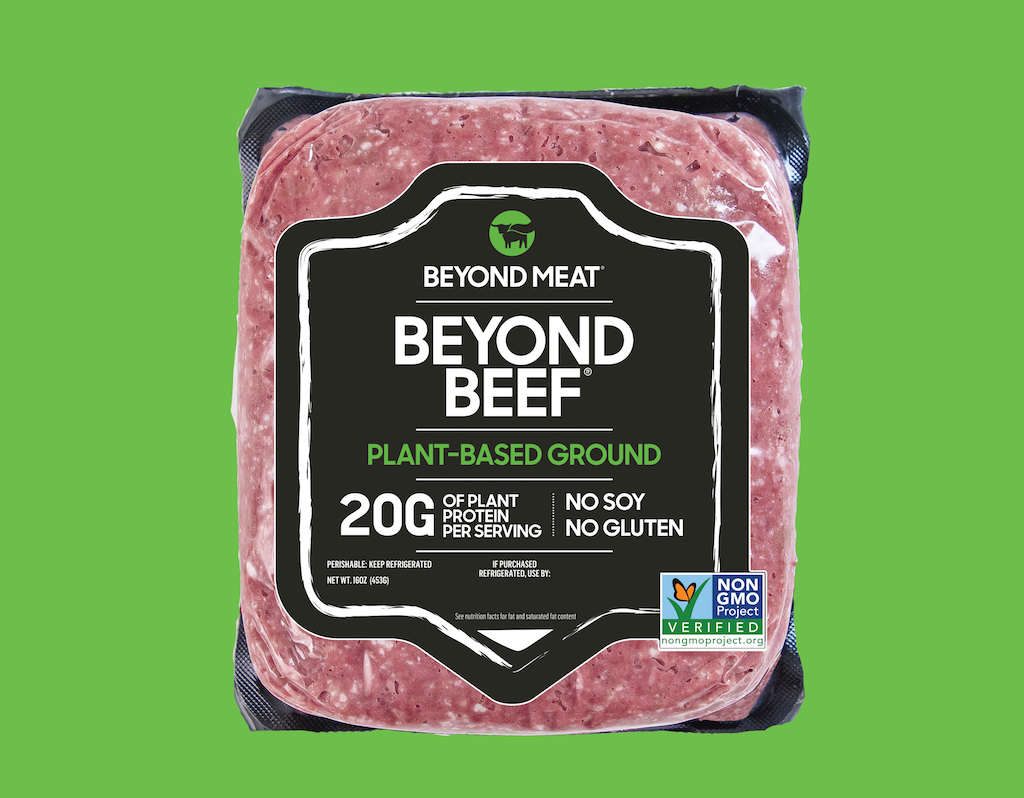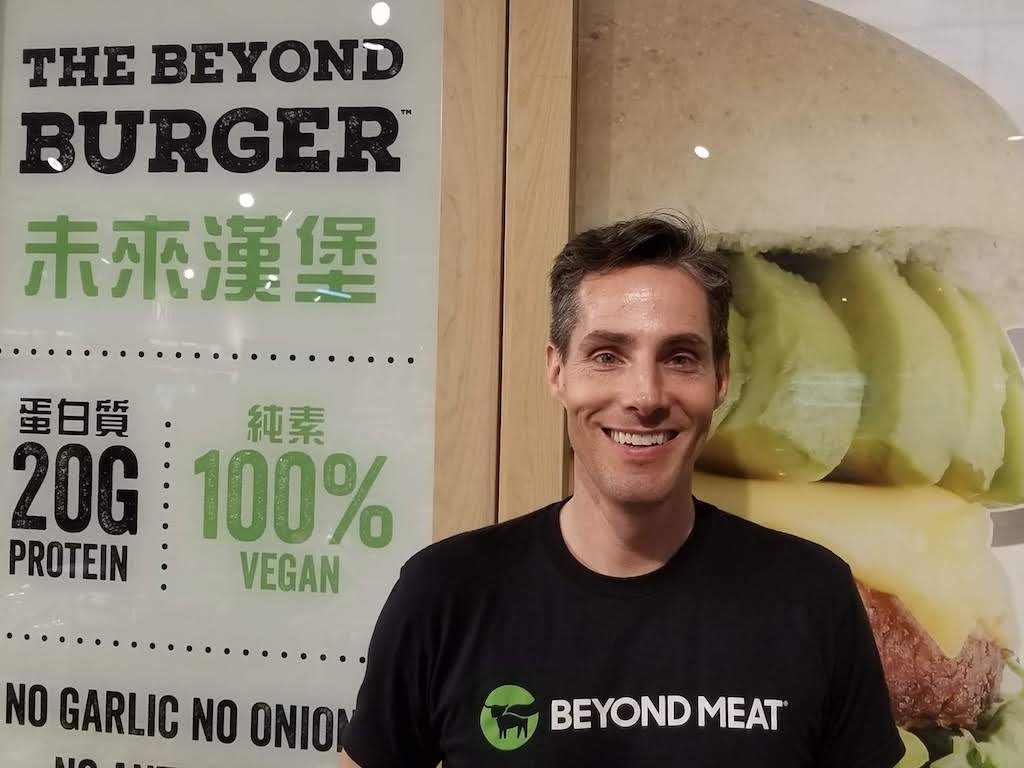13 Mins Read
The Story of The (Plant-Based) Burger That Changed The World
Green Queen Editor-in-Chief Sonalie Figueiras sat down with Will Schafer, VP of Marketing for Beyond Meat, during his recent trip to Hong Kong in May 2019 to discuss how the company created a plant-based food revolution and pioneered a new type of marketing for meat alternatives. Below is in the interview transcript of their eye-opening conversation covering topics like how Beyond Meat changed vegan product marketing, some of their biggest marketing successes, their ‘taste first’ ethos, the record-breaking IPO, lab-grown meat and the upcoming Beyond Meat China launch.
Great to be talking to you Will. Let’s dive right in: what would you say have been some of your biggest successes when marketing Beyond Meat? What are some of the things you did differently?
WS: One of our biggest (marketing successes) was insisting that our products be in the meat case. Our central thesis as a company, which runs through everything we do is that we are making meat, just directly from plants.
Ethan (Brown, Beyond Meat’s CEO) posed the question “Why does meat have to come from a cow or a pig if you can find all the same building blocks of meat (amino acids, fat, minerals, water, ) in the plant kingdom?” And you can put them together in a way that, when viewed under a microscope, it resembles animal protein! That’s exactly the case with Beyond Meat. We’re trying to redefine meat in terms of its composition instead of its origin.
And that’s a complicated story to tell so one compelling way from a marketing perspective to assert that and have it be noticeable and maybe provocative to consumers is to insist that it be merchandised with meat because it is meat, it’s meat made directly from plants. The media noticed it (when the company launched at the Whole Foods meat case in 2016), consumers noticed it, it’s fun and easy to share.
Who came up with this idea?
WS:I’m actually not sure who came up with that…I think it’s something that was built into our DNA from Day 1. Why would you sell meat next to frozen ice cream? It’s meat.
And was Whole Foods supportive right from the start?
WS: Early days, no one was biting. We didn’t aggressively pursue this as a marketing strategy until we created the Beyond Burger. The Beyond Burger was the first product that really was breakthrough in terms of being juicy and meat and really looking the part.
So that was going to be my next question- there was Beyond Meat before Beyond Burger. And did you know when the Beyond Burger was coming out, when you tasted it, did you know that it was going to be such a game changer?
WS: I was pretty bullish. Yah, I thought this is going to be a game changer. I did. I think people ten or twenty years from if they’re looking back on this amazing successful transformation of our meat industry (and hopefully they will be writing those articles), Beyond Meat will be a major player in that. And they will likely talk about two inflection points- the Beyond Burger is one and I think the IPO will be the second.
When I tasted the Beyond Burger for the first time, it was just…at that point when I connected the dots, I said wow. This is it. This could really be a game-changer for us and for the movement. You become an instant-believer when you take a bite of the Beyond Burger. Tasting is believing. This is meaty, it’s satisfying, it’s delicious..
We trademarked the phrase ‘Eat What You Love’. We’re trying to enable a continuation of people’s love affair with meat and the only way that can continue in a sustainable way is if it’s made directly from plants. That’s our attempt as a company to have this paradigm shift between obliging people with a product around the notion of sacrifice which is how Gen-1 meat alternatives were marketed and Gen-2 plant-based meats promoted around this notion of desire- hey, eat what you love, enjoy it, just with less of the health, environmental, and animal warfare baggage of traditional meat.
Going back to this idea of making the marketing more about desire and positivity, how important was it to focus on the message of ecological footprint and how the product compares to meat from an environmental standpoint.
WS: In terms of our marketing focus, we really focus on taste. Taste is the number one thing because that, in my opinion, is the category barrier. Plant-based meat alternatives have a bad reputation. Everyone has had a bad experience with a dry, hockey puck veggie burger. And if you’re trying to convince meat loving consumers to try a Beyond Burger, the number one thing you’ve got to get past is this idea that: Oh, it’s going to taste terrible. That is why our top focus for consumers is around this visceral appeal-the meaty taste, texture and overall sensory experience. The face that you find it in the meat section and cook it the way you would cook traditional meat lends credibility to this traditional appeal. It’s meat!
We sometimes say: with a Beyond Burger you can have your meat and eat it too. Versus talking about health. That’s the number one reason people come to the category, at least in the US. I am still learning about other markets but in the US, the number one reason people are looking for alternatives to animal proteins is health. They don’t want the cholesterol, they don’t want the saturated fat. These are the top two nutritional elements of meat they are trying to avoid. That’s why they come to the category but the reason they may stand at the shelf and walk away is that they’re not sold that it’s going to be worth it, it’s not going to taste good. We’ve got to get over that barrier. So that’s why we lead with taste versus lecturing about health or the environment…people don’t want to be lectured. That’s our opinion at least.
So you include the information on your website but you don’t lead with it.
WS: That’s not what we lead with. We’re all about satisfaction.

Were you in those meeting with Whole Foods, showing them the burger and saying ‘we want to put that in the meat case’?
WS: I wasn’t in those meetings on the Sales side. That was largely Ethan and our VP of Sales at the time. But basically I’ll tell you what happened. There’s a forward thinking guy named Tom Rich who is the head of the Rocky Mountain division for Whole Foods in Colorado and he said “I”ll give it a shot. I’ll put it in the meat section at Whole Foods in Boulder and let’s see what happens.” And we of course, from a marketing standpoint, we didn’t want to leave things to chance so we prepared a press release, let people know, told influencers, and went to the store with four of our team members. I was there, and we had what we thought was 3-4 weeks of supply. It was gone in an hour and a half! It was a validating for my instinct that we were really onto something.
But how did you get that message out? How did all those people know to come?
WS: Well Beyond Meat already had quite an influencer following and a few media friendlies. We put out a release and I did an exclusive with Stephanie Strom at the New York Times…I think the Times broke that morning and within hours people were driving from hundreds of miles away coming to the Whole Foods in Boulder to buy Beyond Burgers.
And they were sold out!
WS: Sold out! So from there, the dominoes started to fall. Whole Foods said great, ‘this is amazing, let’s roll it out nationally over the course of the next three or four months.’ Conventional stores were still a little on the fence, which was surprising to us…but eventually Safeway in Northern California said: We’ll give it a shot’ and we put our whole marketing muscle behind the launch. The day after Safeway happened, Kroeger called!
Another marketing milestone is getting into Carl’s Jr. Getting into a legit, meat-centric burger chain. That to us is the food service equivalent of getting into the meat section of grocery stores.

So can you explain a little bit about Carl’s Jr for Asian audiences.
WS: Carl’s Jr is like a Burger King or a McDonald’s in the US.
How many outlets does Carl Jr have?
WS: Over a 1,000. And I would say before Carl’s Jr, A&W in Canada were the first traditional burger chain to launch with the Beyond Burger. A&W is the second largest chain in the country behind McDonald’s, so, a big deal in Canada. In January, A&W did their earnings call with analysts and their same store sales were up 10% last year and they put it in the menu in July so only half a year. 10% growth is unheard of in the fast food industry and they largely credited it to Beyond Burger.
They actually credited that on the record? That’s a huge validation.
WS: It’s huge. And we’re hearing similar stories from Del Taco. They went on record saying the Beyond Burger has been their most successful new item launch ever and same store traffic is up, people who never even went to Del Taco are going to Del Taco so there’s this amazing effect that Beyond Meat has had for these partners. So that’s a major validation. It creates credibility when these meat-centric chains say these things. That’s the best kind of marketing you can get, when it’s coming from someone else, versus just us.

So going back to what we talked about earlier. Why Beyond Burger and why now? Is it really just that the product is so good?
WS: I think it’s an idea whose time has come, to borrow the Victor Hugo quote that Seth (Goldman), our Chairman) has been using. There are enormous pain points associated with meat- health, environmental, animal welfare.
But it’s interesting because one on hand we’re saying that there are these markers globally that have caused this shift but on the other hand, we’re saying that it’s important not to lead with that from a marketing perspective.
WS: Exactly, so we don’t need to tell that story. From my perspective and I think a lot of people at Beyond Meat share this, no one likes to lectured. I think it’s a good reminder to say that we have less saturated fat than beef and that we have no GMOs. The main trade magazine for the meat industry shared a study from 2015 said that 70% of US consumers were actively trying to reduce their meat consumption. People realize that meat has serious baggage that comes with it. So that’s just a massive pain point for meat.
And then there’s the environmental side of things where people are realised that they’re cutting down the Amazon in order to grow soy and other feed crops to feed cattle. And that is an incredibly inefficient way to produce protein for human consumption. And that’s where Beyond Meat comes in with our LCA and says there’s a better way to create meat, you just skip the cow. The cow’s a bioreactor turning all this plant matter into meat. But we don’t need that process, we have a much simpler process, it goes directly from the plants to the meat.
WS: So when people have been asking ‘what do you think is behind the success of Beyond Meat?’ and ‘why is there so much excitement behind the IPO?’ it’s because it’s more than a cool, tasty product. There are major economic and social drivers behind this thing that aren’t going to change.
So what about cell-based meat? What are your thoughts on that as a technology?
WS: Beyond Meat looked at that as a technology early on. Ethan will tell you that. The concern is that it would not be economically viable on the timeframe he was looking that and who knows whether it will scale the way people hope it will. Especially on the timeframe, it could take ten or twenty years and we can’t afford to wait.
But philosophically?
WS: I would eat it, yah. Absolutely. I love meat and I think Beyond Meat would say that we love meat. Meat is an amazing part of our evolution as a species and our culture and so many of our traditions globally revolve around meat, especially in the US. And we’re about trying to continue that tradition without the downsides. And if you can do that with cellular meat, great, in terms of the overall impact we’re trying to have. At some point, they might become competitors…
When you look at all the people jumping into the space and there’s more and more brands and people like Nestle are saying we’re going to have our Incredible Burger, what are your thoughts on that?
It’s a rising tide. But I will also acknowledge that we’re a competitive company. We have investors who have entrusted us with their resources and we owe it to them and ourselves to be smart. So we are investing in a major way in R&D and will continue to be the leader in the plant-based category in the next wave of plant-based meats. So in that sense we are competitive too. We’re a for profit company. When it’s us versus Nestle trying to win a major account, we want it to be us. But the real competition is meat so you have to be able to see both sides of it.
What are some exciting products coming out?
WS: We’re most excited about the upcoming launch of Beyond Beef. It’s a bulk drop-in replacement for ground beef. You can use it to make any beef recipe- meatballs, tacos, dumplings here in Asia, it’s very versatile. It’s a different formula than the existing Beyond Burger. Different ingredients, it looks different, it has visible fat inclusions made from coconut butter. It really looks like ground beef and has this heterogenous texture…Some parts are hard, some parts are soft, just like ground beef. I think it’s our best product yet. It’s also got a more neutral flavour profile. It’s meant to be a blank canvas so you can use it for anything.

So you’ve been in Asia, you’ve been in China and you’re in Hong Kong. What has been your impression so far?
WS: It’s been eye-opening to see how much meat consumption there is in China. Hong Kong has a reputation for being very meat-centric. In terms of China, there’s a reason why T. Colin Campbell did the China Study. He was looking for a large consumer base where he could do this naturally engineered epidemiological study…
He could not do it today!
WS: He could not do it. I met a guy at SIAL in Shanghai who said he had come back to China after twenty years in the US and it was unrecognisable just in terms of the economic development and how things have changed around meat consumption. So that was really eye-opening – meat is huge in China. At the same time, people are become aware of some of the pain points tied to meat around health and the environment. So we’re realising that there probably is a market for Beyond Meat products as they are. We certainly want to, over time, be customising Beyond Meat products to the local market but initially part of our challenge as a company is to drive scale. So to the extent that we can take existing products, make more of them more efficiently, lower the cost. So one of the questions I came in with, is there a market for Beyond Meat in China and I think there is. Burgers are a thing. There’s McDonald’s. There’s Burger King. There’s local chains serving burgers. My sense is there’s a market, especially in Tier 1 cities, and that it’s ready for our products. I was surprised by the level of trade and consumer awareness for Beyond Meat and what we’re doing and the excitement around us being there. Sometimes you don’t know until you go. So I’m excited to come to China and expand our reach in Asia.
Part of the reason for this awareness is Green Monday, your partner in Hong Kong and greater Asia. What has been the best thing about working with David [Yeung] and his team. How has it been working with them?
They think like marketers, they are marketers. Green Monday having its roots in being a movement I think gives them an orientation as marketers which they have brought to promoting the Beyond products in Asia. Through Green Monday, we now have Beyond Meat in Hong Kong, Singapore, Taiwan and other countries, so they’ve just been really fantastic in terms of helping us launch in exciting ways that create buzz like the food truck in Singapore at the Hyatt. That kind of partnership has been one of a kind. We don’t have another partner quite like them in any other market. We have great partners in Australia and Europe but they don’t have the same level of marketing prowess.
This interview is based on the conversation’s live transcript. Some parts have been edited for clarity and consistency. Jun 25 2019: This interview has been further updated for clarity and syntax.
Lead photo courtesy of Green Queen, all other images courtesy of Beyond Meat.





